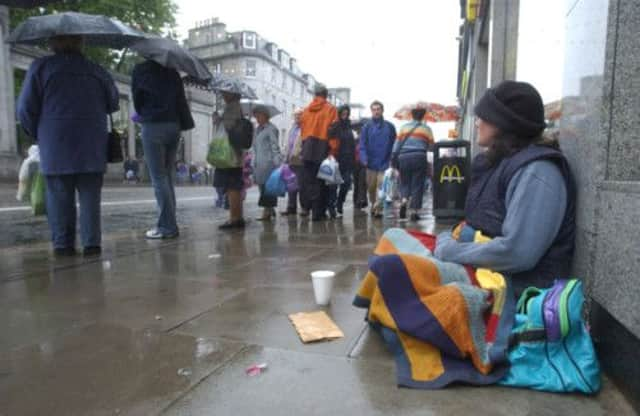Aberdeen council to agree begging outlaw plans


The Labour-led coalition is expected next week to agree to continue with a joint approach with Glasgow City Council in collecting evidence of the need for street begging to be criminalised.
And council officials have already drafted a potential byelaw which would make it an offence, punishable by a fine, for a person within a designated area of the city centre to beg or induce the “gifting of money or
goods.”
Advertisement
Hide AdAdvertisement
Hide AdEarlier this year the council’s administration was accused of resorting to “Dickensian” politics by the SNP after leaders of the rainbow coalition first announced proposals to drive beggars from the streets by making begging a criminal offence.
The Scottish Government has also warned that Ministers will not support the controversial plans.
A report, due to go before a full meeting of the council next Wednesday, is recommending that councillors support the continuation of joint working with Glasgow City Council and other local authorities to collect evidence for the introduction of a special byelaw .
Neil Carnegie, the council’s Service Manager for Community Safety, states in his report: “Council officers have been working with counterparts from Glasgow Community Safety Services who are working with Glasgow City Council on preparing a case for a street-begging byelaw.
“Officer advice is that a combined approach supported by evidence from various local authorities may be more persuasive than individual approaches. Glasgow colleagues intend convening a meeting of representatives from other Scottish cities in the near future to progress this approach. Initial discussions have identified that gathering evidence of need for a byelaw would focus on: impact on business; complaints and feedback from the public; links between street-begging activity and other crime in the locality; benefit and tax fraud; and levels of engagement with support services.”
But he also reveals: “Officers consider that street-begging activity has decreased in the past three months. This applies particularly to begging activity by migrant street-beggars. More robust policing is likely to be the main reason for this reduction.”
Mr Carnegie explains: “Increased focus on street-begging this year prompted police to review their response to street-begging activity. Since April 1st police have been taking a far more pro-active approach to dealing with incidences of street-begging that they encounter on patrols and in response to complaints received. Greater use of public space CCTV to monitor activity is also an element of their enhanced approach. This more pro-active approach is considered to be a main reason for the perceived reduction in street-begging activity in recent months.”
According to the report, Police in Aberdeen received 67 complaints about street-begging activity between 2010 and June of this year. Most of the complaints related to allegations of aggression and intimidation towards members of the public.
Advertisement
Hide AdAdvertisement
Hide AdBut Mr Carnegie states: “It should be noted that police also receive complaints from street-beggars reporting as victims of aggression and intimidation from members of the public.”
His report also reveals that the Aberdeen City Division of Police Scotland has voiced its support for further investigation and appraisal of a byelaw to prohibit street-begging. But the Procurator Fiscal, who would be responsible for prosecuting offences under any future byelaw, has “raised some concerns” about the need for a byelaw, its potential effectiveness, its potential impact on the criminal justice system and also raised issues related to its enforceability.
He adds: “The Scottish Government are unequivocal that they do not support byelaws for street-begging. Police Scotland and the Procurator Fiscal would concur that there are already sufficient powers to deal with aggressive begging.”
A Scottish Government spokeswoman said today: “For anyone begging in an aggressive manner and behaving in a manner that constitutes a breach of the peace or using threatening and abusive behaviour, a range of existing criminal laws can be used to prosecute them for this behaviour and we support our police and prosecutors in exercising their judgement based on the circumstances before them.
“We do not support attempts to criminalise the act of non-aggressive begging and we would not support any local authorities who wish to introduce such a byelaw within their areas. We consider that a multi-agency approach is best for dealing with begging so that the underlying causes of people begging in the first place can be tackled such as drug dependency and alcohol dependency.”
But Councillor Willie Young, a leading member of the Labour-led administration, insisted that action was needed.
He said: “It is no use going on Union Street at the minute, stepping over beggars and pretending that they are not here. We need to do something about it.”